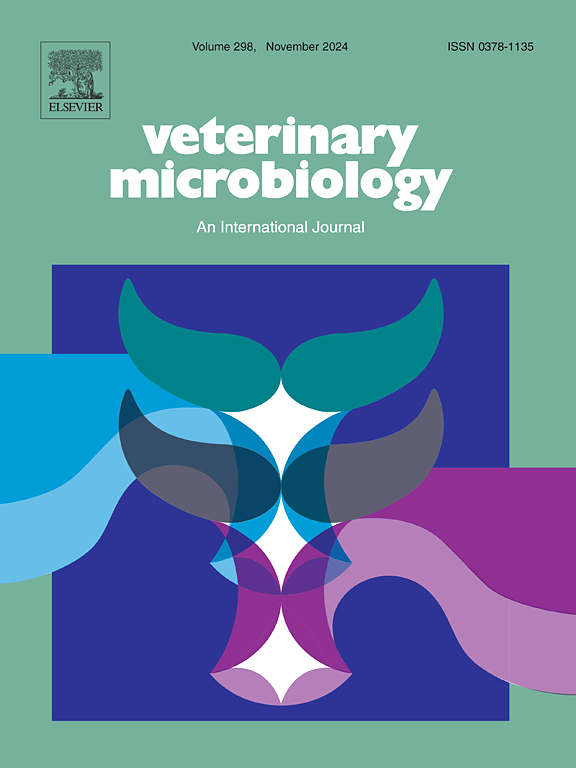Enhanced protection through genotype-matched bivalent H9N2-Newcastle disease virus vaccination: Comparative efficacy against contemporary field strains in specific-pathogen-free chickens
IF 2.7
2区 农林科学
Q3 MICROBIOLOGY
引用次数: 0
Abstract
Newcastle Disease Virus (NDV) and Low Pathogenic Avian Influenza (LPAI H9N2) infections cause substantial economic losses in poultry production globally. Despite widespread vaccination, outbreaks persist due to antigenic mismatches between vaccine and circulating field strains, highlighting the need for improved vaccines with better genetic and antigenic matching. This study evaluated the efficacy of a novel bivalent inactivated vaccine (Aviline FLU H9 ND-K) containing genetically matched H9N2 (Saudi Arabian strain, G1 lineage B) and NDV (LaSota genotype II and genotype VII.1.1) strains against contemporary field isolates. The novel vaccine was compared to a commercial vaccine containing heterologous H9N2 (UAE origin, G1 lineage C) and NDV (Ulster strain, genotype II) antigens in a controlled challenge study. Seventy specific-pathogen-free (SPF) chickens were allocated to seven groups (n = 10/group) and vaccinated subcutaneously at 4 weeks of age. Four weeks post-vaccination, birds were challenged with either LPAI A/chicken/Egypt/SP3/2022 (H9N2) or NDV-B7-RLQP-CH-EG-12 (genotype VII). Clinical protection, antibody responses (hemagglutination inhibition), viral shedding (qRT-PCR), and cytokine expression interleukin-6 (IL-6), interferon-gamma (IFN-γ) were comprehensively assessed. Both vaccines conferred 100 % protection against clinical disease and mortality. However, the Aviline FLU H9 ND-K vaccine induced significantly higher antibody titers against both H9N2 (p < 0.001) and NDV (p < 0.05 at 7- and 14-days post-challenge). Viral shedding was substantially reduced in the genotype-matched vaccine groups, with H9N2 shedding eliminated by 7 post-challenge (dpc) with marked reduction by 5 dpc compared to 7 dpc with the commercial vaccine (p < 0.01). Similarly, NDV shedding ceased by 7 dpc in the Aviline FLU H9 ND-K group but persisted in the commercial vaccine group (p < 0.001). Pro-inflammatory cytokine expression was more effectively modulated in birds receiving the genotype-matched vaccine, with significantly lower IL-6 levels (p < 0.01) and higher IFN-γ expression (p < 0.05) compared to birds receiving the commercial vaccine. These findings demonstrate that the genotype-matched vaccine provides superior immunogenicity, enhanced viral clearance, and improved immunomodulatory effects, emphasizing the critical importance of antigenic matching in vaccine development for effective control of evolving avian pathogens. The potential impact on viral evolution and transmission dynamics within vaccinated populations warrants further investigation.
通过基因型匹配的二价h9n2 -新城疫病毒疫苗增强保护作用:在特定无病原体的鸡中对当代田间菌株的比较效果
新城疫病毒(NDV)和低致病性禽流感(LPAI H9N2)感染给全球家禽生产造成了巨大的经济损失。尽管广泛接种疫苗,但由于疫苗与流行的田间菌株之间的抗原不匹配,疫情持续存在,这突出表明需要改进具有更好的遗传和抗原匹配的疫苗。本研究评估了含有基因匹配的H9N2(沙特阿拉伯G1株B)和NDV (LaSota基因型II和基因型VII.1.1)菌株的新型二价灭活疫苗(Aviline FLU H9 ND-K)对当代野外分离株的效果。在一项对照挑战研究中,将这种新型疫苗与含有异源H9N2(阿联酋源,G1系C)和NDV(阿尔斯特菌株,基因型II)抗原的商业疫苗进行了比较。选取SPF鸡70只,分为7组(n = 10只/组),于4周龄皮下接种疫苗。接种疫苗4周后,用LPAI A/chicken/Egypt/SP3/2022 (H9N2)或NDV-B7-RLQP-CH-EG-12(基因型VII)攻击禽类。综合评估临床保护、抗体反应(血凝抑制)、病毒脱落(qRT-PCR)和细胞因子表达白介素-6 (IL-6)、干扰素-γ (IFN-γ)。这两种疫苗都提供了100% %的预防临床疾病和死亡率的保护。然而,在攻毒后7天和14天,Aviline FLU H9 ND-K疫苗诱导的H9N2抗体滴度(p <; 0.001)和NDV抗体滴度(p <; 0.05)显著提高。在基因型匹配的疫苗组中,病毒脱落明显减少,H9N2脱落被7个攻毒后(dpc)消除,与商业疫苗的7个dpc相比,显著减少了5个dpc (p <; 0.01)。同样,在Aviline FLU H9 ND-K组中,NDV的脱落停止了7%,但在商业疫苗组中仍然存在(p <; 0.001)。在接受基因型匹配疫苗的鸟类中,促炎细胞因子的表达被更有效地调节,与接受商业疫苗的鸟类相比,IL-6水平显著降低(p <; 0.01),IFN-γ表达显著升高(p <; 0.05)。这些研究结果表明,基因型匹配疫苗具有优越的免疫原性,增强了病毒清除能力,并改善了免疫调节作用,强调了抗原匹配在疫苗开发中对有效控制进化的禽病原体的重要性。对疫苗接种人群中病毒进化和传播动态的潜在影响值得进一步调查。
本文章由计算机程序翻译,如有差异,请以英文原文为准。
求助全文
约1分钟内获得全文
求助全文
来源期刊

Veterinary microbiology
农林科学-兽医学
CiteScore
5.90
自引率
6.10%
发文量
221
审稿时长
52 days
期刊介绍:
Veterinary Microbiology is concerned with microbial (bacterial, fungal, viral) diseases of domesticated vertebrate animals (livestock, companion animals, fur-bearing animals, game, poultry, fish) that supply food, other useful products or companionship. In addition, Microbial diseases of wild animals living in captivity, or as members of the feral fauna will also be considered if the infections are of interest because of their interrelation with humans (zoonoses) and/or domestic animals. Studies of antimicrobial resistance are also included, provided that the results represent a substantial advance in knowledge. Authors are strongly encouraged to read - prior to submission - the Editorials (''Scope or cope'' and ''Scope or cope II'') published previously in the journal. The Editors reserve the right to suggest submission to another journal for those papers which they feel would be more appropriate for consideration by that journal.
Original research papers of high quality and novelty on aspects of control, host response, molecular biology, pathogenesis, prevention, and treatment of microbial diseases of animals are published. Papers dealing primarily with immunology, epidemiology, molecular biology and antiviral or microbial agents will only be considered if they demonstrate a clear impact on a disease. Papers focusing solely on diagnostic techniques (such as another PCR protocol or ELISA) will not be published - focus should be on a microorganism and not on a particular technique. Papers only reporting microbial sequences, transcriptomics data, or proteomics data will not be considered unless the results represent a substantial advance in knowledge.
Drug trial papers will be considered if they have general application or significance. Papers on the identification of microorganisms will also be considered, but detailed taxonomic studies do not fall within the scope of the journal. Case reports will not be published, unless they have general application or contain novel aspects. Papers of geographically limited interest, which repeat what had been established elsewhere will not be considered. The readership of the journal is global.
 求助内容:
求助内容: 应助结果提醒方式:
应助结果提醒方式:


